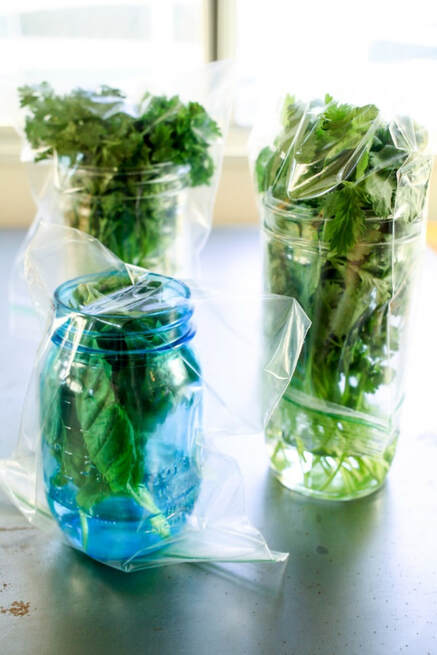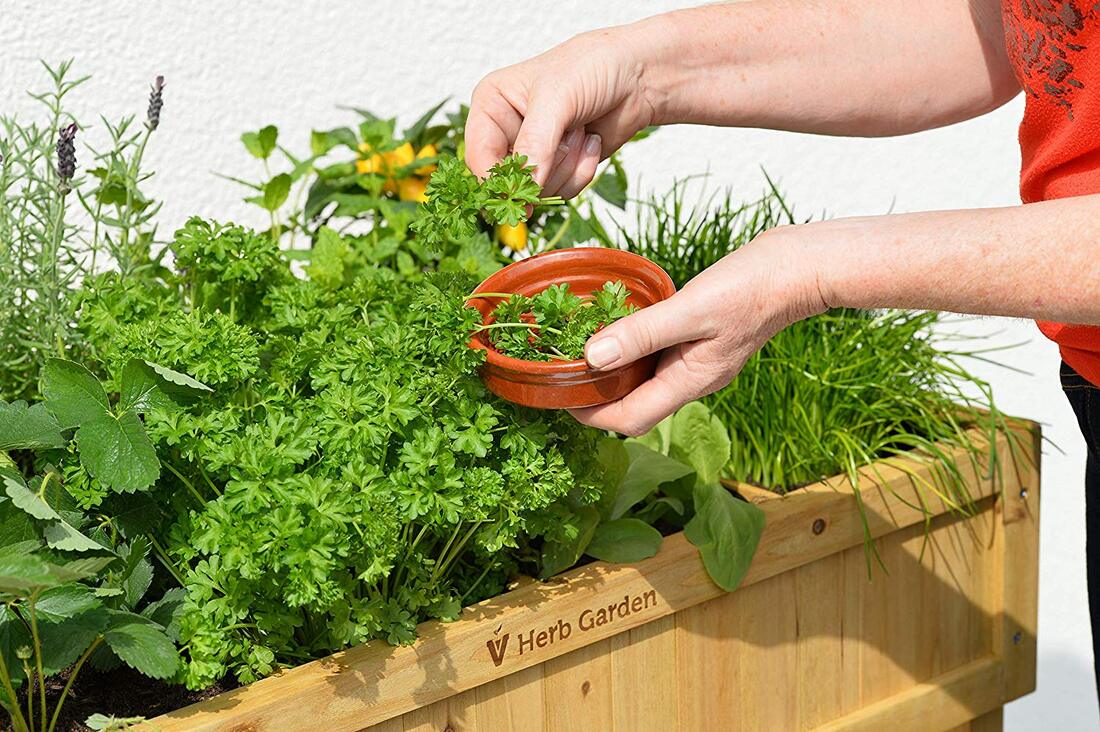|
It’s a privilege to pluck a handful of freshly grown mint or basil from our kitchen garden and use them to garnish our yummy meal preparations. Indeed, it gives us a sense of accomplishment and mental satisfaction knowing that the herbs we use are completely fresh without pesticides. Nowadays, terrace farming, backyard gardening or potted plants are becoming an indispensable part of each of our houses where we grow plants and flowers of our choice. Among roses, hibiscus and aloe vera we have our tiny little fenugreek, coriander, curry leaves, rosemary, Thai basil or even parsley cluttered in fancy pots aligned in our precious balconies or garden terraces. Welcome to the flavored world of herbs! Herbs are used for garnishing and flavoring food, in medicines and as fragrances for their aromatic and savory properties. They are different from spices in that herbs refer to only the leafy green or flowering part of the plant whereas spices are dry fetched from other parts of the plant such as seeds, fruits and barks. But this is only in the culinary herbs and when used for medicinal purposes herbs might refer to any part of the plant such as flowers, roots, seeds and leaves. Some of the herbs that many of us are familiar nowadays include thyme, sage, lavender, parsley, basil, rosemary, coriander, mint and even turmeric. Growing herbs at home is not only fun but also favors health apart from flavoring foods. Different herbs including cilantro have been used as anticonvulsants but their mechanical pathway was unknown until now. For long, cilantro has been used for reducing seizure activity in the brain (by binding to a specific part of the potassium channel and activating it) apart from being reported as a great anti-cancer, anti-inflammatory, anti-fungal and analgesic agent that’s been used by mankind for more than 8000 years. Going Back to Our Ancestral Methods Herbs were used as weapons to ward of ill-health by our ancient humans but somehow lost its charm with the overpower of science and technology in the 19th century. Almost 5000 years ago Sumerians discovered the lifesaving property of myrtle and thyme, Chinese herbal pharmacology sustained priority and magic right from first century AD and in Renaissance England, chamomile, hyssop and tansy were strewn on the floor to stay safe from plague (https://www.nytimes.com/2018/11/21/t-magazine/herbs-cooking-food-flowers.html). In due course, these wonder plants were restricted to kitchen use either as flavoring agents or garnishing materials for salads and food. Herbs were ripped off their uniqueness and special properties and restricted to their usefulness in culinary purposes. Life is a giant wheel where ups and downs are part of every individual. Also, those that have been discarded as petty and outdated soon seen the light of day in due course and this is true in the case of most things right from fashion and appearance to foods, dishes and practice methods. If you are eager to start using herbs in your cooking but in a great dilemma whether it should be coriander or thyme, I would recommend the basil and tarragon to start with! Both of them are rich in flavor and aroma blending well with mild-tasting vegetables, fruits, proteins, sauces, dressings and condiments. Thai basil can be used with anything that adds a sweet tinge to your dish while tarragon, a staple of French cuisine, is widely used in preparing pesto sauces that enhance the taste of your pasta or protein serving. You can add some basil to your soup preparations, lavender to your salads and even prepare chamomile tea to ease your cold! Healthy Twist to Herbs Many people nowadays try using herbal supplements to ease pain and improve health. A third of cancer patients in a study reported relying on herbal medicines, alternative medicines or chiropractors as a remedy for pain but rarely reported this to their attending physician. Almost 29% of them in the study did not report this to their doctor and another study found that individuals using complementary or alternative medicines (CAMs) were two times likelier to die from disease as they mostly did not take up recommended treatment procedure. People strive hard to save themselves from cancer and use dietary supplements alongside their cancer treatment procedures as well without telling their doctor. What they fail to notice is the fact that these supplements might interact with the treatment procedures either causing harm to the patient or reducing the overall effectiveness of the treatment procedure which finally affects the patient only. That’s mainly because many did not feel the need to inform their doctor or simply because the physician did not question them on it. China is one of the main countries practicing herbal medicine therapy and their belief in traditional medicines is so strong that pharmacies deliver meds based on unauthorized herbs alongside formal pharmaceuticals. But now we have been doomed with the news that a specific ingredient found in some of these supplements might influence cancer just like smoking. Birthwort is a leafy vine abundantly present in China containing a compound called aristolochic acid that’s used to ease childbirth and treat arthritis mainly. Later, this compound became part of weight loss pills, ointments and other treatment plans to cure rheumatoid arthritis and menstrual symptoms. Warnings and mishaps about these pills came into limelight when several women consuming them for weight loss started complaining about kidney failure in the 1990s. Several herbs have been used in preparing herbal extracts that have the property to protect brain cells, serve in treating asthma, bronchitis and brain disorders. Latest buzz is the use of adaptogenic herbs to neutralize cortisol levels thereby reducing stress levels in an individual. There are more than 50 herbal plants that are proud of owing this property of which two most-famous of them are tulsi and Ashwagandha root (both of them own a standard place n Ayurveda which is deep-rooted in India). It is believed that Adaptogens play a critical role in adrenal glands same like what exercise does to muscles but we need further research in needed in this field. Apart from medical and culinary use herbs also find a place in bouquets, floral arrangements and beauty products! They are treated as equals to flowers alongside roses and orchids, given as bouquets wrapped in string to treat asthma patients and find a place in posh buildings as architectural diagrams and paintings too!  Store Herbs in the Right Way to Retain Freshness Store Herbs in the Right Way to Retain Freshness Storing them Right Buying herbs is no big deal. It all depends on how you save its freshness and fragrance. Soon after buying your favorite herbs rinse them in free flowing water and leave them to dry for a couple of hours. Then, place them in damp paper towel wrapping them up, placing them in a plastic bag and storing them in a refrigerator. For softer herbs like parsley and cilantro it is better to trim the stems of the herb and keep it in a jar covered with 1-2 inch of water. Cover the herb once again with a plastic bag securing it with a thread or rubber band to press the air out and keep it refrigerated until use. Freezing also helps in preserving the herbs minus their texture. You can either chop the herbs and keep them in a freezer tray or zip them into freezer bags. While basil, thyme and cilantro are regular ones why don’t you get your hands full on a few different ones like the lettuce-leaved basil, summer savory, chop suey greens or sweet bergamot to spice up your culinary taste and skills? These might be completely new but they are worth the time and effort taken to locate their seeds and grow them in pots. References Third of Cancer Patients Use Herbal Remedies, Chiropractors and Alternative Medicines: https://www.independent.co.uk/news/health/cancer-alternative-medicine-herbal-remedy-homeopathy-acupuncture-a8865336.html 10 Herbs You Probably Haven’t Heard of But Must be Growing: https://www.theguardian.com/lifeandstyle/2018/may/05/10-herbs-probably-havent-heard-of-should-grow-alys-fowler Common Herbal Supplement Linked to Cancer: https://www.sciencemag.org/news/2013/08/common-herbal-supplement-linked-cancer What are Adaptogens and Why are People Taking Them? https://time.com/5025278/adaptogens-herbs-stress-anxiety/
0 Comments
Leave a Reply. |
AVOID FRAUD. EAT SMART.+91 7846 800 800
AuthorDietitian & Nutritionist Dr. Nafeesa Imteyaz. Archives
July 2024
Categories
All
Dr. Nafeesa's Blog @blogspot |
- Home
- Written Testimonials
- Consult
- Clinics
- Blogs
-
Diet & Nutrition
- Diabetes Reversal
- IVF IUI not needed for PCOS PCOD Infertility
-
Medical Nutrition
>
-
Disease & Conditions
>
- Infertility | PCOS
- Diabetes Mellitus
- Cholesterol
- Hypothyroid
- Kidney Problems
- Hypertension
- Cardiovascular Diseases
- Liver Diseases
- Gastro intestinal disorder
- Cancer
- Metabolic Disorders
- Orthopedic Disorders
- Eating Disorders
- Dietary Recall
- Weight Record Filled By Clients
- Online Payment Transaction Details
- Online Clients Weight Check Form
- Our Program Package Service Charges
- Weight Record 2017 Clients
- Measurements sent by Clients
- Terms & Conditions Of Payment
- Thanks. Your Form is Submitted
- Video Testimonials
- Lifestyle & Wellness
- Lifestyle & Wellness Blog
- Allergy & Intolerance
- Weight Loss / Gain
- Weight Loss / Slimming Blog
-
Disease & Conditions
>
- Life Cycle Nutrition >
- Sports Nutrition >
- Integrity in Nutrition
- Knowledge Centre
© COPYRIGHT 2022. ALL RIGHTS RESERVED. FRST HEALTHCARE PVT LTD.
Dr. Nafeesa Imteyaz of First Eat Right clinic, is the Best Dietitian Nutritionist in Bangalore. Best Dietitian Nutritionist in Pune. Best Dietitian Nutritionist in Hyderabad. Best Dietitian Nutritionist in Chennai. Best Dietitian Nutritionist in Mumbai. Best Dietitian Nutritionist in Delhi. Best Dietitian Nutritionist in Kolkata.


